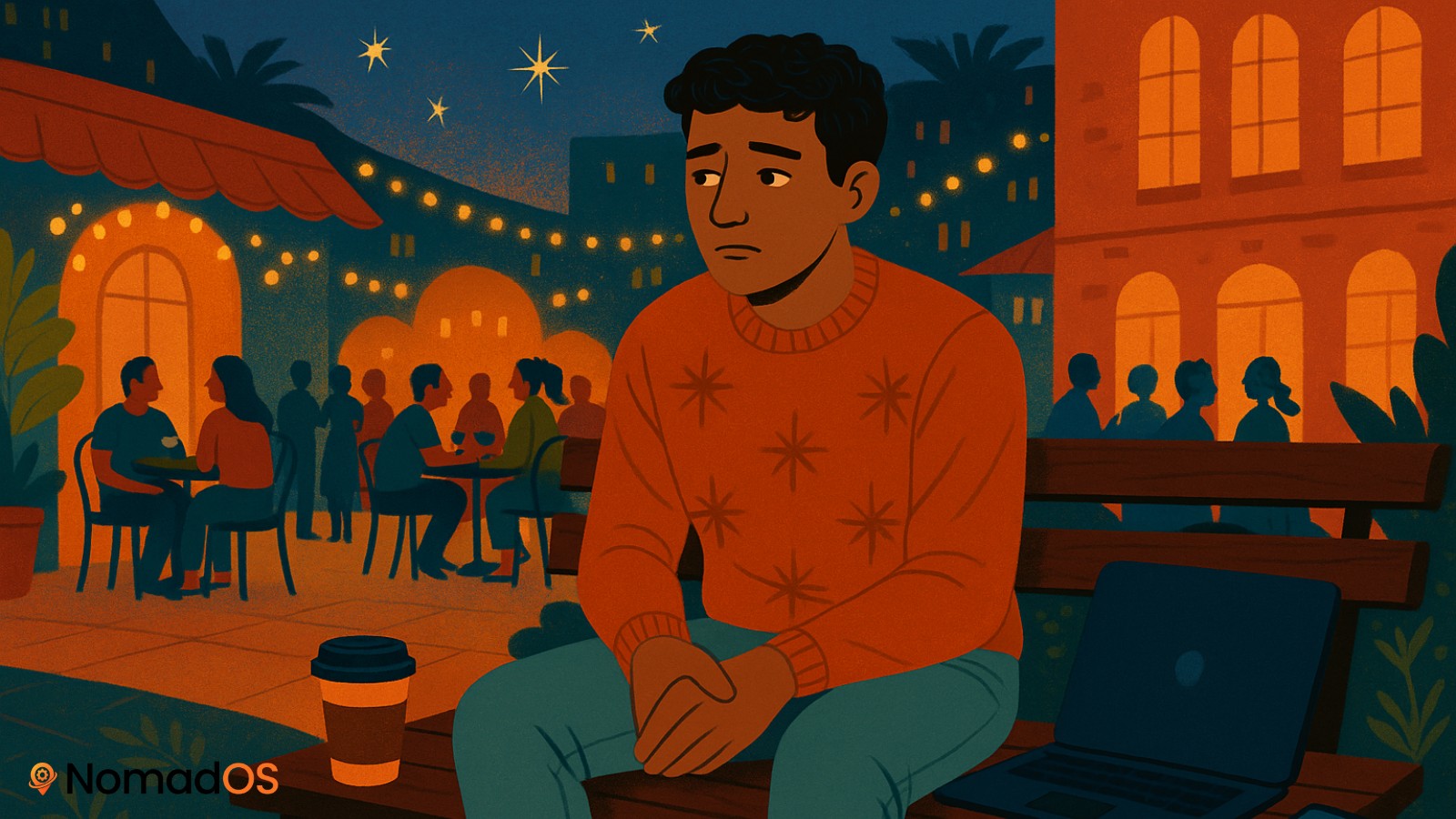Most people assume the hardest part of being a digital nomad is finding reliable WiFi or decent accommodation.
And sure, those things matter.
But after talking to hundreds of nomads and digging through countless forum discussions, there’s one challenge that comes up more frequently than any other: loneliness.
It’s not the romantic, soul-searching kind of alone time either.
It’s the crushing realization that you’re surrounded by millions of people in an amazing city, yet you don’t have a single person to call when you need to vent about a bad work day or celebrate landing a new client.
One nomad on Reddit put it perfectly:
“The loneliness is real (and unexpected). Fleeting friendships wear thin. After two years, I didn’t want another expat dinner. I wanted to bump into someone who knew my favourite wine, my cat’s name, my birthday.”
That hits different, doesn’t it?
Why Loneliness Hits Nomads So Hard
Starting over every few months
Here’s what nobody tells you about nomad friendships…they’re exhausting!
Every few months, you’re essentially starting over.
New city, new coworking space, new faces. You have the same conversations (“Where are you from? How long are you staying? What do you do?”) on repeat.
Sure, you’ll meet other nomads at meetups and coworking spaces. You might even become close friends. But there’s always an expiration date hanging over every relationship.
They’re moving to Lisbon in three weeks. You’re heading to Thailand next month. Everyone’s temporary.
As one nomad described it:
“Being a DN is basically living nearly friendless in a real world… you have friends, but they are temporary.”
Surface-level connections can feel hollow
Surface-level connections are easy to make when you’re nomading.
Deep, meaningful relationships?
That’s where it gets tricky.
Building real friendships takes time, shared experiences, and consistency. When you’re constantly moving, you miss out on all three.
You don’t get to be there for someone’s birthday three years in a row. You can’t develop inside jokes that span months.
You miss the small moments that actually cement friendships: grabbing a drink after a tough day, helping someone move apartments, or just having someone who knows your order at the local café.
Your safety net can disappear
Back home, you probably had a network you didn’t even think about.
Coworkers who’d cover for you when you were sick. Friends who’d pick you up from the airport. Family nearby for emergencies.
As a nomad, that safety net disappears.
When your laptop dies in Bangkok and you’re stressed about a client deadline, there may be no one to call on who really gets it.
Your friends back home are dealing with their own lives eight time zones away. And your close nomad friends are in completely different cities.
Other Challenges Can Make Things Even Worse
While loneliness is the big one, it doesn’t exist in isolation. Other challenges compound the problem, making that sense of disconnection even more intense.
When nothing feels familiar anymore
Establishing any kind of routine becomes a constant battle.
You finally find a great gym, figure out where to buy groceries, discover the perfect work café, and then… it’s time to move again.
“Staying fit is extremely hard,” one nomad explained. “This is primarily due to my desire to explore the new city and culture. The food I eat isn’t always healthy, and some places it’s hard to find a decent gym.”
Without routines, everything feels harder.
Your work suffers. Your health takes a hit.
And when you’re already feeling isolated, these additional stressors make it that much tougher to put yourself out there socially.
Logistics can kill your social battery
Finding accommodation, figuring out internet reliability, navigating local bureaucracy, dealing with visa requirements.
These practical challenges eat up mental energy that you could be using to build connections. When you arrive in a new city, you’re juggling multiple competing priorities all at once: finding a good gym, where to buy food, discovering workspaces, exploring the city, actually getting your work done, and yes, meeting people too.
Something usually has to give.
And while it’s easy to fit in surface-level socializing like meetups or coworking events, building deeper connections requires consistent, slower interactions that are harder to prioritize when you’re trying to establish routines and see everything a city has to offer.
By the time you’ve got everything sorted, you might realize you only have a few weeks left.
At that point, most nomads shift into “experience maximization” mode rather than “relationship building” mode.
You start prioritizing that famous museum or restaurant over having a third coffee with someone who could become a real friend.
Even when you do meet locals or other expats, cultural differences can create additional barriers to deeper connections in the short term.
Understanding social norms, navigating language barriers, and figuring out how friendships work in different cultures can take time and adds another layer of complexity to an already challenging situation.
The Reality Check
Here’s the thing…you can work around most nomad problems.
Slow internet? Find a coworking space. Uncomfortable bed? Book a different place next time. Bad weather? Move somewhere sunnier.
But loneliness?
That’s not something you can solve with better research or a bigger budget. It’s a fundamental challenge of the lifestyle itself.
And it has real consequences.
Chronic loneliness doesn’t just feel bad, it impacts your work performance, physical health, and mental wellbeing.
Some nomads end up cutting their travels short. Others stop moving entirely, settling in one city just to build stable relationships again.
This isn’t meant to scare anyone away from the nomad lifestyle. Many people successfully navigate these challenges and love their nomadic years. But it’s important to go into it with realistic expectations.
If you’re considering nomad life, think honestly about how much social connection matters to you.
Are you comfortable with surface-level friendships? Can you handle spending a lot of time alone? Do you have strong relationships back home that can provide emotional support remotely?
Some nomads thrive on the independence and constant newness. Others discover they need deeper roots than the lifestyle typically allows.
Neither approach is right or wrong, but knowing which type you are can save you from some painful discoveries down the road.
So How Can You Make It Work?
For those who do choose the nomad path, understanding this challenge upfront can help you plan for it. Some key strategies that work:
Move slower: Staying 3-6 months in each place instead of 3-6 weeks or less gives relationships more time to develop.
Prioritize nomad-friendly cities: Places with established nomad communities make meeting people easier.
Invest in existing relationships: Schedule regular video calls with friends back home. Don’t let geographic distance kill relationships that matter.
Be intentional about connection: Make meeting people a priority from day one, not something you’ll get to “once you’re settled.”
Push yourself socially: Regardless of your personality type, you’ll need to put yourself in potentially uncomfortable situations. Join coworking spaces, attend meetups, say yes to invitations. People won’t just find you.
The biggest challenge nomads face isn’t logistical. It’s human. And acknowledging that upfront might just be the key to handling it better.
Is It Worth It?
Only you can answer that.
For some people, the trade-off is absolutely worth it. The freedom, experiences, and personal growth outweigh the social challenges.
For others, the loneliness becomes too much.
The key is being honest about what you need to be happy and fulfilled. Because no amount of amazing sunsets or cool Instagram photos can replace genuine human connection when that’s what your soul is craving.


